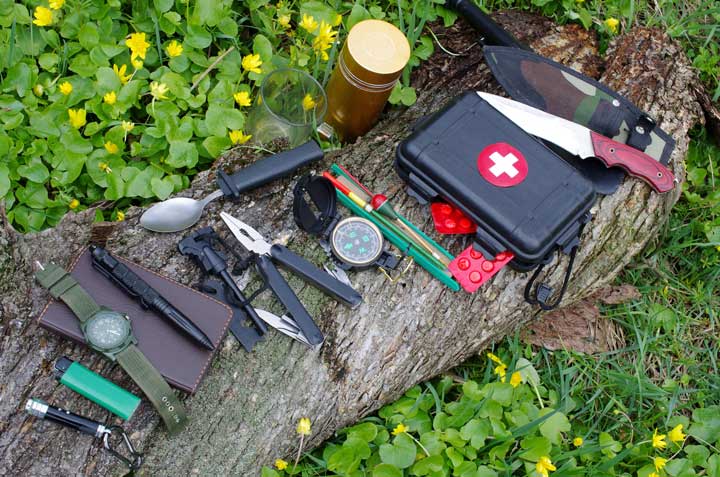In our modern age, our consumption is becoming increasingly unstable. Our power plants overheat the planet; plastic is dumped in the ocean, forests are cleared to make new factories. It’s no coincidence that natural disasters are becoming more frequent and more dangerous. Even if one doesn’t strike, it’s frighteningly easy to get in trouble while hiking.
It’s never foolish to be prepared for a worst-case scenario, and that’s precisely where survivalism comes in. But what is survivalism? In a word, preparation.
What is the Meaning of Survivalism?
To put it simply, survivalism is the goal of staying alive despite hostile conditions.
Potential disasters, however, can arrive entirely unexpectedly. That’s why survival training and preparation are vitally important to any survivalist.
There are two groups that often get confused, preppers and survivalists. The main difference between these two is that Preppers plan to stay local, usually having a bunker or safehouse stored with supplies. Alternatively, survivalists intend to roam and settle anywhere they can live sustainably (often referred to as Gray Men).
Because of their focus on sustainability and living alongside nature, survivalists are far better equipped for when produce does become scarce. Ultimately, they’re better suited for long-term survival or living away from civilization.
What Does a Survivalist Do?
It’s easy knowing what a survivalist is, but understanding how they’re able to plan for a life away from civilization is the first step to learning how you can do it too.
Primarily, survivalists practice their skills through study and real-life instances. The three main things people need to survive are food, water, and shelter. Being able to source all of this sustainably from your environment is key to keeping you alive for as long as necessary.
The other thing a survivalist does is remain ready for disaster. Some have essentials (like fire-starters) stashed in their car; others carry bin bags for a makeshift shelter. Keeping these things close by means they’ll waste less time getting themselves safe if things do go wrong.
By being prepared for the worst, learning how to be adaptable, and equipped to gather the three necessities from their environment, survivalists are well-equipped when confronted by dangerous situations.
How Do Survivalists Live?
There’s a misconception that survivalists are all hermits, wearing tin foil hats in their bunkers and fearing the end of days. That simply isn’t the case, and luckily the stereotype is starting to change.
So How Does a Survivalist Live?
Just like everyone else, in ordinary lives in cities and towns. The only difference is they’re prepared – and they’re getting more popular.
They’ve learned skills, like foraging and hunting, to help them survive should the worst happen. These skills usually go hand-in-hand with equipment that is already set up or easy to do on the fly. A bug-out bag (also known as a go-bag), for example, is a common and intrinsic piece of the survivalists’ arsenal.
For reference, it’s a bag filled with specific equipment and long-life foods. They’re also kept in secure but easy to access places; because you never know when disaster will strike.
How Do You Become a Survivalist?
If you want to become a survivalist, the good news is you’ve already taken the first step; research.
The basis of becoming a survivalist is learning to survive in a range of dangerous situations, from being lost in the woods during a hike to having to survive the aftermath of a natural disaster. If you can plan, prepare and strategize what skills will keep you and those around you safe, that’s how you become a survivalist.
But knowing is only half the battle. You’ll need to practice and hone your skills. Survivalists spend significant time in the wild, making sure their skills are able to provide without damaging their surroundings.
So go camping. Bring only what you need, and try to provide for yourself. Practice living without any additional support – within reason. If you’ve never hunted before, pack some food as a backup.
If you have a garden (or any sort of green space), you can also try growing various fruits, vegetables, and herbs. Not only will this teach you how to cultivate, but also how to harvest only what you need.

What Makes a Good Survivalist?
Ultimately, a good survivalist is someone who’s adaptable to changing situations. The best tool at your disposal is always going to be your head. You can have all the best quality gear, but if you don’t know how to use it effectively, then you might as well not have it at all.
If you think your skills are up to scratch, then test them. If your survival relies on specific tools, how would you cope without that tool? If your kit got lost in a storm, what would you do?
Good survivalists take note of where their weaknesses are – then work on fixing them. You have to be ready for every eventuality if you want to overcome adversity.
What is a Survival Expert?
A true survival expert can survive sudden transitions to almost any circumstances with no external support. One of the most famous experts, Dave Canterbury, is also an incredible font of knowledge for those interested in survivalism.
Canterbury has produced several books, such as Bushcraft 101, where he demonstrates the knowledge for surviving in the wild. He also appears in well-known survivalist TV shows, including Dual Survival, and has his own YouTube channel, an excellent source of information.
To be considered a survival expert, you need to prove that you have what it takes to survive away from civilization without harming your surroundings. You don’t need detailed plans for every eventuality, but you do need the knowledge and skills to adapt to a changing world.
